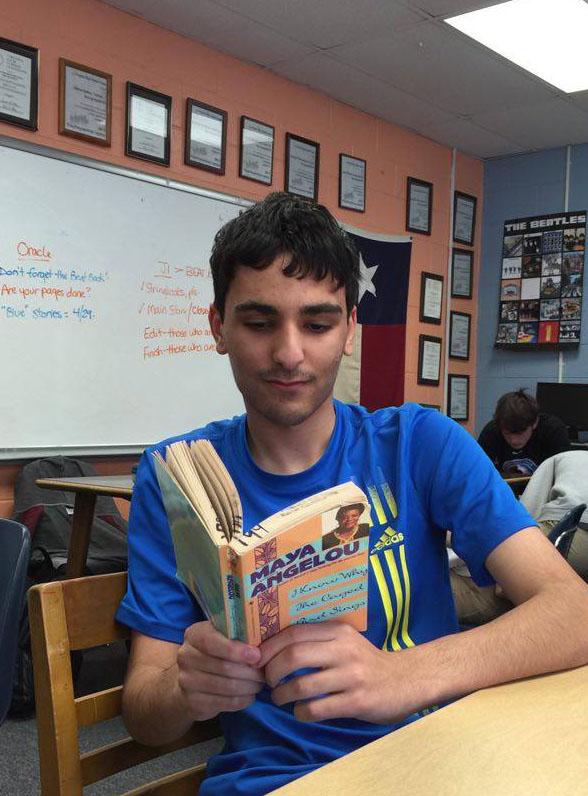Literature classes dodge censorship bill
Junior Adam Golub is reading I Know Why the Caged Bird Sings, a book that discusses sensitive topics.
May 5, 2016
Imagine English class as a place for reading bland children’s books instead of page turners such as In Cold Blood. Thanks to our governor Terry McAuliffe, the Beloved Bill was vetoed and this will not, in the foreseeable future, be the case.
This bill would force all Virginia schools to notify parents of books with possibly sexually explicit content; its epithet as the Beloved Bill is a response to a Lake Braddock SS mother’s concern over her son reading Beloved, a classic novel with adult themes. Book lovers across the state were outraged when the bill passed the Virginia Senate 22-17 and the House of Delegates 77-21, only to screech to a halt with Gov. Terry McAuliffe’s (D) veto.
In order to assure this outcome, supporters of the bill read a portion of Beloved aloud, taking powerful scenes completely out of context.
“This bill is blocking the free flow of ideas,” said English Department Chair and teacher Jennifer Beach. “Any time a book is vilified based on a portion of the content is unfair.”
The system proposed is similar to the method Fairfax County already has in place, one of the reasons McAuliffe cited for his rejection. Each FCPS high school has a committee composed of parents and educators that has to approve books. Then, teachers warn parents on the syllabus (the one all parents sign, right?) if they have stronger themes and a parent or guardian can choose to opt-out from a certain book.
Proponents of the bill want to ensure that what their children are reading is appropriate, a valid concern of all parents.
“I get where parents are coming from, but this is good exposure,” said senior Eva Du. “We can’t be shielded forever.”
Several teachers have called the Beloved Bill a slippery slope to censorship and a hair away from book banning, alarming book connoisseurs across the state.
Librarian Susan de Salpini was adamantly against the bill, going as far as to writing to the governor and urging a veto.
“[‘Taboo’] books challenge thinking and ask larger societal questions,” said Salpini. “Teachers choose books with reason, and [we must] respect their professional opinion.”
There are novels that, as most WS teachers agree, should not be taught in a high school environment because adolescent students would not relate to their symbols and messages. Teachers have the responsibility to select titles that will enrich the education of their students, and WS’ English department has excelled at that, as well as accommodating different needs that may arise.
“It’s wrong to deprive the students of an opportunity to experience new things through books,” said junior Ashley Mertsock. “Books show you things that you wouldn’t be able to do or know on your own.”







![According to the FCPS Restorative Justice Brochure, restorative justice comes with seven primary goals. Part of building the welcoming community comes through the class circle process. “It’s voluntary and everything that is said there is confidential,” said counselor Monica Hayes. “It’s the beginning of those [strong] relationships [in the community].”](https://theoracleonline.org/wp-content/uploads/2024/04/unnamed-28.png)







